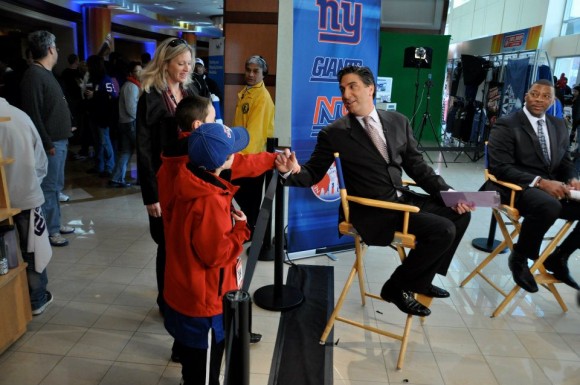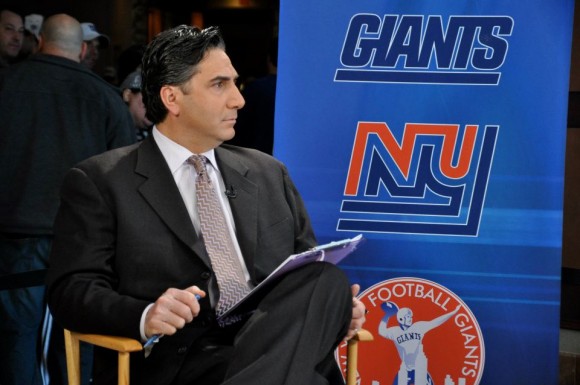Bob Papa: The Voice of the New York Giants
“Eli Manning. Back to throw. Under pressure. Avoids the rush, and he’s gonna … fight out of it! Still fights out of it! Now throws it deep down field to a wide-open Tyree! Who makes the catch!”
Do you remember what happened that play? I’m sure you do, if you’re a Giants fan. If you’re not, you might not know who was making that radio broadcast. His name … Bob Papa.
Privileged to have called several Super Bowl broadcasts, Bob Papa, then in middle school, was equally, if not MORE privileged to do the play-by-play of his mother doing the dishes and his father reading the newspaper.
Papa’s dream of becoming a radio broadcaster stemmed from listening to local sports radio his entire life. Papa, having grown up a Giants, Knicks, Rangers and Yankees fan during the pre-cable TV era, found himself listening to radio broadcasts because most of their games were not nationally televised and there wasn’t any other outlet for their transmission. Papa enjoyed listening to the broadcasts, believeing radio was truly the “theater of the mind” due its obvious lack of imagery. “Depending on how good the play-by-play guy is, you need to visualize everything and make your own pictures using your mind,” Papa expressed.
Calling “the goings-on” within his house, he began honing his play-play skills at an early age; he called his morning walk to school, and even his pick-up basketball games WHILE he was playing, which happened to infuriate the opposition. And when a professional game was broadcasted, you would find Papa sitting in his living room in Dumont, NJ with the sound down calling his own version of the game.
“I would literally set up one of those old fashioned metal snack tables … I had two separate tape recorders—one for the play-by-play and the other for the theme music and crowd noise—and I practiced my play-by-play off the T.V.,” he fondly recalled.
Papa’s unrelenting passion for radio broadcast remained steady into his college years. After
his first year at the University of Delaware, he realized that he wouldn’t have much of an opportunity to pursue his broadcasting dreams because Delaware’s sporting events were covered by a local professional broadcast company. Student radio had no part in broadcasting games. With that, Bob packed his bags and went back to NYC where he enrolled at Fordham University. Fordham boasted one of the best college radio stations in the country. Notable graduates include Michael Kay (broadcaster for the Yankees) and Mike Breen (lead announcer for the Knicks).
The radio program at Fordham immediately put Papa at the forefront of the action. Now close to the only two local sports talk radio shows: Art Rust Jr.’s weeknight show and the Fordham’s show on Saturday and Sunday nights. Bob’s next opportunity emerged from a new service being offered by a company called Sports Phone. Bob’s role? Announcer.
Sports Phone was a phone service sports fans would call for score updates. How did it work? Sports Phone employees would gather the scores from stringers all around the country approximately every ten minutes and record the information on paper. They would then give that information to the announcers and he/she would notify the callers of the game scores. Additionally, some Sports Phone employees had the privilege of attending games and getting pre-game and post-game interviews with professional players and coaches. This aspect of the job helped Papa extend his network even further, as his name was heard more and more.
As an announcer, Papa had the credentials to attend Knicks, Yankees and Mets games. As such, he would have to get pregame interviews with players and coaches and do the same for the postgame. After capturing the interviews, Papa would then have to cut the tape accordingly to compile and edit his 45-second pregame report and get all of his sound bytes in order. The same process was repeated for the postgame, extending his night(s) until about 2 a.m. As Bob had hoped, all of his hard work would eventually pay off.
Papa now worked on the “Yankees Hotline” through Sports Phone with John Gordon, the Yankee’s play-by-play announcer. Said hotline was essentially a two-minute report going out over the phone along with any radio station around the country that wished to access it. Papa would take in the feeds and make sure the tape was running while Gordon did the announcing. Gordon, recognizing Papa’s talent and dedication to the craft, recommended Papa for his first job with the Utica Blue Sox.
Having landed his first gig with the Utica Blue Sox, a NY Yankee farm team, Papa felt out of place during his first few months there because he wasn’t doing the amount of play-by-play broadcasting he had hoped. Instead, he was broadcasting a sports talk show that relied on guest callers, having remembered one specific time when he didn’t get a phone call for four-and-a-half hours! Bob packed his bags once again and moved back to New York and got his job back at Sports Phone full-time. Like many young talented individuals, looking to find their place in the world, Bob was discouraged because of his inability to fulfill his passion in the form of a steady career and path.
“I was depressed. ‘What do I do?’ I’ve been doing this [working at Sports Phone] since my sophomore year of college. I don’t want to get stuck here like the others I saw,” Papa remembered.
However Sports Phone came through again for him by providing a plethora of contacts and connections. One being the Fordham Athletic Director, who asked Papa to be the PA announcer for the school’s basketball team. In that position, one day before a Fordham-Seton Hall basketball game, he met Marty Glickman. Glickman was the on air play-by-play talent for the Giants on WNEW radio from 1959-1971 and also broadcasted for Seton Hall basketball at the time. He asked Bob to send him his two best play-by-play tapes. Glickman listened and thought Papa’s play-by-play was tremendous! Before Glickman went on his annual ski trip, he informed Seton Hall that he wanted Bob to do the play-by-play for the basketball games while he was away. This exposure showcased Bob’s talent wonderfully, helping him obtain a job at WNEW (the NY Giants radio affiliate) as a sports radio cohost in 1988.
SUCCESS!!! At 24 years old, Papa was able to break into the New York Giants organization. He went on to participate in pioneering the Giants Point After postgame show, as well as the pregame tailgate show that took place outdoors by the Meadowlands Racetrack. Bob’s career was on the rise as the tailgate show became a moneymaking machine. He then started filling in as the Giants’ play-by-play radio broadcaster when incumbent, Jim Gordon, was not available. Bob, thriving in that role, became Gordon’s backup, and when Gordon resigned in 1995, Bob took over his coveted role full-time. The rest, as they say, is “history”…
Papa currently announces for the Golf Channel and HBO, and is most known for his broadcasting on WFAN (660 AM) for the New York Giants. For Papa, weekly leading up to Giants game day, just about every minute, hour and day is filled with preparation and analysis. Every game broadcast for the Giants requires approximately 25 hours of prep during the week to ensure he is ready to deliver the audience a colorful and informative play-by-play. This entails statistical analysis of the players, information about theopposing team, and what Papa likes to call his “specialty stats.” They include red-zone efficiency, touchdowns, career milestones a player might hit that week, a player’s career numbers versus the opponent, etc. Papa finds it critical to call upon all his talent, experience and passion to engage the listener with the utmost of his announcing abilities. Packaging all the work on and off the air into a personal experience, second to none, that’s what defines Bob Papa.
“I provide the eyes and ears for football fans. When calling games on radio and describing the action, I try to bring the in-stadium experience to people in their cars or at home and make them feel like they are one of the select 80,000 people in the stadium,” says Papa.
All of which wouldn’t have been possible without hard work and clear direction, but most importantly, a home where Bob Papa could do the play-by-play of his mother doing the dishes and his father reading the newspaper.
Follow Bob on Twitter: @BobPapa_NFL






